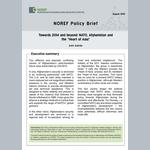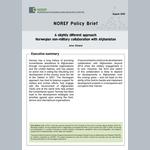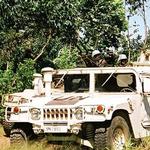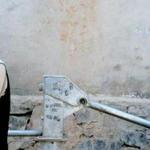Heading for trouble in Afghanistan
For the past ten years, international donors have tried to strengthen the formal justice sector in Afghanistan, and, with the support of NATO and ISAF, to build a national army and Afghan police forces. Slow progress and demand for security have resulted in a shift in the international efforts to focus more on informal justice systems. Local defense groups and warlords have been entrusted and supported to provide security, law and order.
The Afghan researcher Akbar Sarwari recently held a seminar at CMI. He has participated in several field studies in Afghanistan, assessing the development in the justice sector for the US Institute of Peace and the Asia Foundation. He warns against the current development.
-The focus on the informal justice system has taken a dangerous turn. The Afghan justice sector is now dominated by armed warlords who collect taxes and impose their own justice over that of the state and the people. If international efforts continue to focus on the informal justice system, the formal sector will be marginalized, says Sarwari.
Shopping for justice
A local defense group typically consist of a leader and 20-30 gunmen. These leaders have, through their military strength, become influential in an informal justice system that traditionally has been administrated by community elders, traditional and religious leaders.
-Since there are no regulations, it is impossible to predict the outcome of a given case, says Sarwari.
The informal justice system has developed into a shopping arena for those who have money. The rich pay the warlords to judge in their favour. The poor have to accept any verdict.
Some of the defense groups are recruited to the Afghan Local Police force, strengthening their power and control. According to Sarwari, some of the groups have been converted to “murder businesses”. They also frequently collect taxes from the population to maintain their operations.
Alongside the Afghan Local Police, local councils (shuras) are increasingly being used as conflict resolution bodies in sensitive cases. The Afghans trust these traditional shuras and respect their decisions. Yet, this extended role of the shuras’ extended role could marginalize the formal justice sector even further.
Women are sidelined
The formal justice sector leaves much to be desired and is very limited, says Sarwari. Corruption is widespread. The conflict resolution bodies are too bureaucratic and centralized, and there is no consolidated system for different parts of the country. Yet, Sarwari urges the international community to unite its efforts and continue to focus on strengthening the formal justice sector at the expense of the informal sector.
-There is undoubtedly a need for more formal training and education, but the courts are there. The universities are the right place to start. Most lawyers in Afghanistan only have a bachelor, and most of them are elderly people. We need younger lawyers, and more female lawyers. The informal justice sector limits women’s access to the justice system, says Sarwari.
In time, Sarwari thinks that women’s position in Afghan society will become more prominent. But for that to happen, the formal justice sector has to be strengthened and legitimized.
-The local shuras are not familiar with women’s rights. The few female representatives in the Afghan peace councils are only names on a paper, he says.
Publications

Towards 2014 and beyond: NATO, Afghanistan and the "Heart of Asia"

Norwegian non-military collaboration with Afghanistan: A slightly different approach
Projects

Protection of Civilians: From Principle to Practice
